The solo travel quotes curated here offer you inspiration, motivation, hope, and validation.
Each quote is accompanied by some of my thoughts about the author, the link to solo travel, or a bit of analysis of the words themselves.
I hope they will provide you with food for thought. If something here resonates with you, please share your perspective in the comments section below. If there is a quote about travel that you love that does not appear here, please add it in the comments at the end of the article. Over time, we can add more to this list.
How Solo Travel Creates Happiness
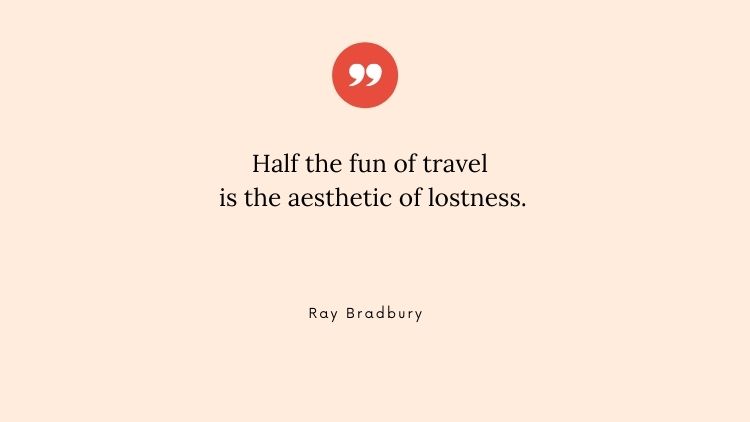
While getting lost may fill some with dread, there are times when I love it, and times when it has resulted in wonderful travel memories.
This travel quote from Ray Bradbury (1920-2012), American fantasy, mystery, science fiction, and horror writer, celebrates the idea of getting lost while traveling.
It reminds me of my first trip to Paris. I would set out in the morning, sometimes boarding one of those hop on/hop off buses, and ride around until something caught my eye. I would get off the bus and wander around, getting lost in the little streets and my own thoughts, inevitably forgetting to get back on as I discovered one thing after another that would lead me off in different directions.
When the sun began to set, I would pull out my Paris map (remember paper maps?), pinpoint my location, then work out a route to get back to the apartment I had rented for the week.
That feeling of timelessness, of casually getting lost, and the feeling of accomplishment once I figured out where I was and how to get myself back to where I started, is one of my favorite travel memories.
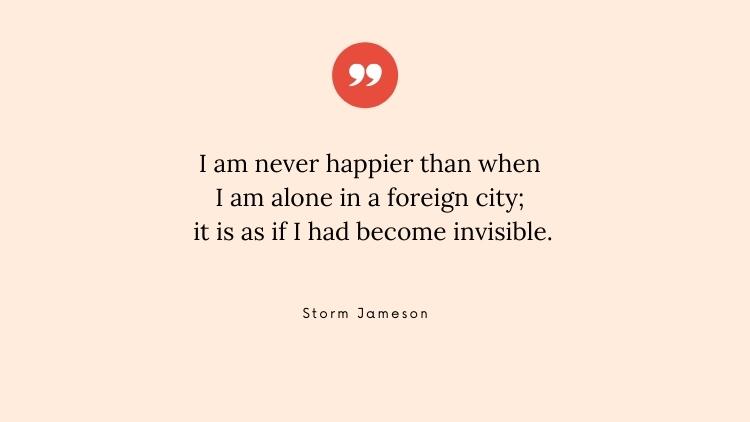
This solo travel quote by English journalist and author, Margaret Storm Jameson (1891-1986) comes from her autobiography, Journey From The North. It resonated with me immediately.
I love the sensation of being the unobserved observer in a foreign city: sitting in a sidewalk café, listening to conversations taking place, watching people walk by; taking a break on a park bench, watching lives play out around me; observing how people interact with one another and discovering how that is different or similar to my own culture.
Traveling alone, I have the ability and the luxury of time to just be still and absorb. Traveling with others, I am constantly engaged with them. Traveling alone, sitting quietly, I am almost invisible, and have the freedom to watch, listen, and contemplate. I notice the smallest details that would otherwise elude me.
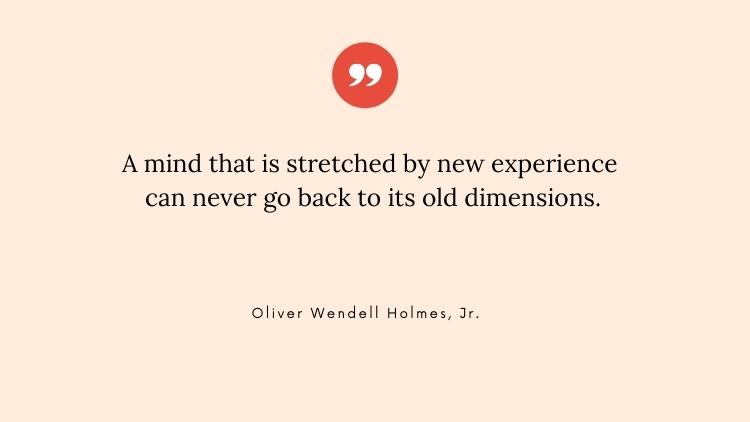
Here is one of the all-time best solo travel quotes, from Oliver Wendell Holmes, Jr. (1841-1935). Holmes served on the Supreme Court of the United States for 30 years, and was one of the most-cited American legal scholars of the 20th century.
While I don't know in what context he made this statement, it certainly applies well to travel–and even more so to solo travel. How better to stretch your mind than to set off on your own to a place you've never been, encountering unfamiliar cultures, landscapes, and cuisine, learning to navigate transportation systems, perhaps attempting to communicate in a new language?
Research is showing that travel–and the new experiences, challenges, and information processing that ensue–increases our creativity.
Once you stretch your mind in these new directions, you will be forever changed. In big ways or small, challenging our brains in unfamiliar ways through travel will have a lasting impact on our lives.
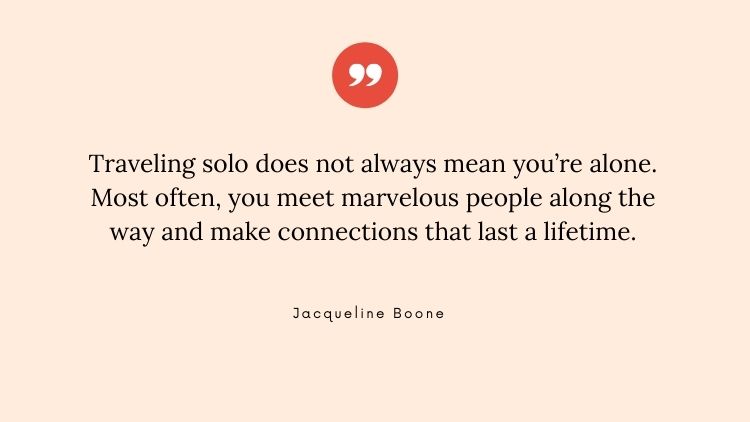
Jacqueline Boone created a blog to document an experiment. Starting with the question, “What would you do if you had six months to live?” she actually spent half a year living her answers to that question, sharing her experiences, and encouraging others to do the same. You can watch her TEDx Talk here.
An avid traveler, Jacqueline encourages everyone who can, to do so. This solo travel quote is pulled from a post she wrote about the arguments people had against her plan to travel around the world. I like it, and I believe it–members of the Solo Travel Society tell us all the time about the amazing friendships they have made while traveling–but I'm not entirely sure that it has been true for me.
I agree that I am solo but not alone when I travel, and I meet many, many interesting and wonderful people along the way, but most of those relationships have been fleeting. It may be simply because I am such a lax correspondent, as any of my long-distance friends will attest. Regardless, traveling solo definitely does not mean that you are always alone; you will meet marvelous people, and you may make lifelong connections, or, at the very least, lifelong memories.
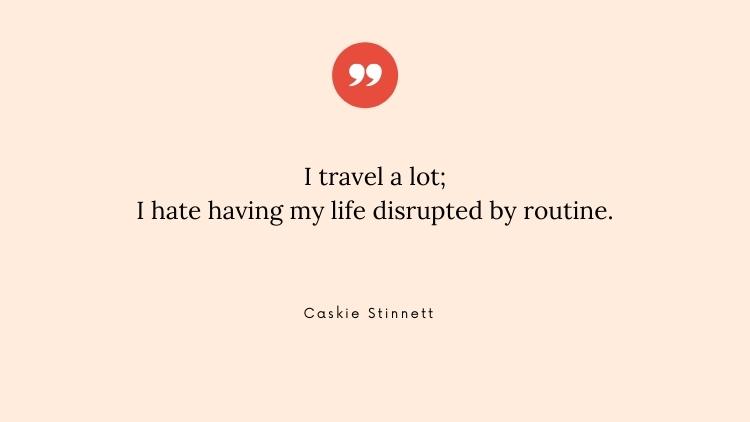
American travel writer and magazine editor, Caskie Stinnett (1911-1998) wrote and edited for publications such as Holiday magazine, the Atlantic Monthly, and Travel & Leisure. Stinnett spent much time traveling, and, according to this quote, that's exactly the way he liked it.
Travel can feel like a suspension of regular daily life; every day is different, we don't have the same obligations, and, especially with solo travel, our schedules – or lack thereof – are completely our own. We can make and break plans on a whim according to what we discover along the way. It's exhilarating!
Stinnett claimed to hate routine, but after all of his travels throughout his 65-year career, he returned to the same place: his island home in Maine. Imagine living in the same place for almost all of your life! Mind you, if, like him, I owned my own island, I suppose that could be very appealing.
To be honest, though, as much as I love travel and hate routine, I am still incredibly happy and grateful to return home at the end of each journey. It seems this may have been the case for the author as well. I need that home base–my people, my community, my things–to keep me grounded. After a long trip, I actually crave a little routine. I am not someone who could travel continuously.
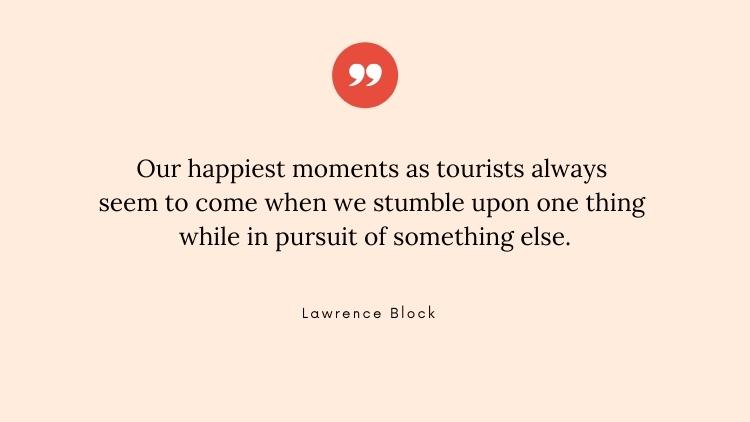
Have you ever had this experience, as described by American writer, Lawrence Block? Of setting out to find something, to see some sight in your travels, then accidentally coming upon something entirely different, unexpected, and wonderful?
Some of my happiest moments have absolutely come about in this way. I once got lost, searching in vain for a well-hidden restaurant, became a bit frantic, then was “rescued” by a friendly stranger and had a lovely conversation that completely turned my day around. I remember the pizza, of course, but I will never forget the man in the market and the chat we had while he walked me to my destination.
I think our happiest moments are rarely about what we see, but about what we feel. Visiting Canada's House of Commons was an important and interesting event. But stumbling upon a peace protest on the lawn of Parliament Hill that day, crawling into a tent to spend a little bit of time actually exercising my democratic right and listening to the stories of dedicated activists–that is what has stayed with me. That is the story that I tell about my trip to Ottawa. That was one of my happiest moments.
On Being Adventurous
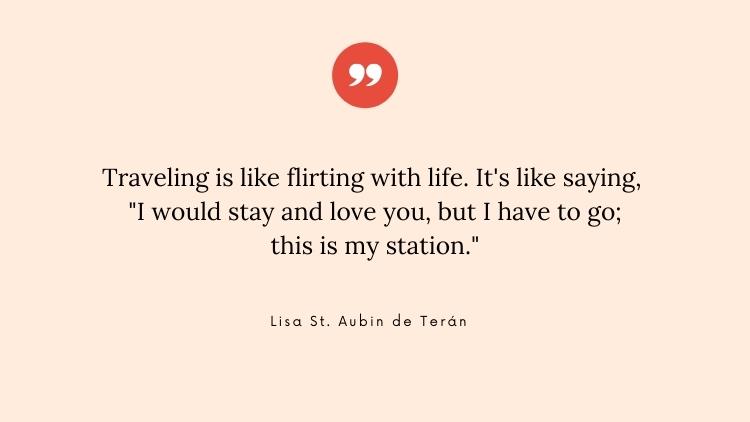
This solo travel quote by novelist, poet, short story and memoir writer, Lisa St. Aubin de Teran comes from her book Off the Rails: Memoirs of a Train Addict. I stumbled upon the quote before knowing the source, so it's interesting that it had immediately conjured up for me an image of train travel.
For most of us, travel is temporary, sporadic, something that punctuates our lives rather than constituting our everyday routine. I like the author's comparison here: travel sometimes does feel like a flirtation to me. How many times have you returned from a trip saying that you had fallen in love with a destination, that you wished you could have stayed longer to get to know it better?
Ah, but there are so many destinations to dance with. I may never settle down with just one.
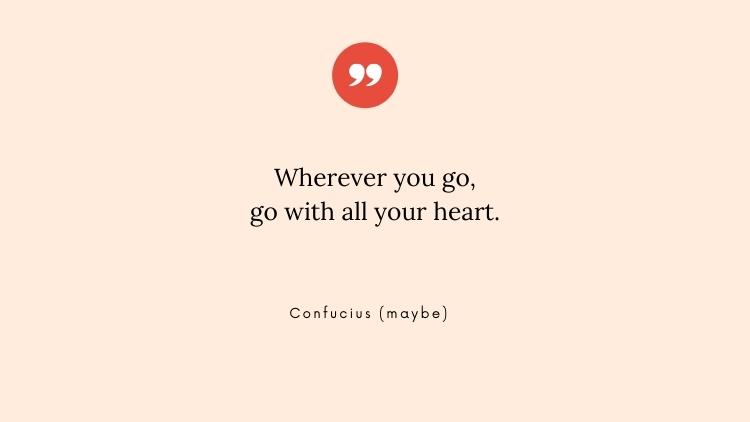
This quote is attributed to Chinese philosopher, teacher, and politician, Confucius (551-479 BC). (Don't hold me to that, as I have no way of proving it, but it seems to be generally accepted by sites that compile interesting quotes.)
It is a very simple and straightforward statement that makes for a great personal travel philosophy.
Wherever you go in this great big world, go forth with an open mind. Leave as many of your preconceived ideas as possible at home. Invite people and destinations to reveal themselves to you–let it all unfold without applying judgment. Try to remove the lens of your own culture and experience new ones from as blank a slate as you can manage.
Observe. Absorb. Share. Repeat.
Go with your whole heart.
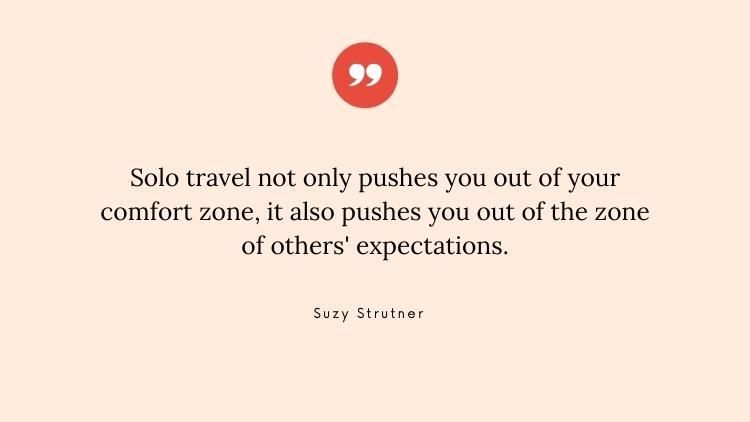
I stumbled across one of the best solo travel quotes in a Huffington Post article entitled, 6 Reasons Every Woman Needs to Travel Alone. Suzy Strutner, Associate Lifestyle Editor for HuffPost Travel wrote about some of the things that women have to gain from traveling solo, including increased confidence, adaptability and creativity, broadening your social circle, and stepping out of the confines of your work.
What really stuck with me, though, was the quote above. I love that solo travel knocks me out of my comfort zone. But even more than that, the notion that solo travel releases us from the expectations of others is very freeing. Traveling without those who know us well and have clear ideas of who we are and the role we play in their lives, we can be anything we wish to be. It brings to mind a quote by William Least Heat-Moon (scroll down to find it), who spoke of how the people we meet while traveling are unburdened by any of our baggage, and see only what we present to them in the moment.
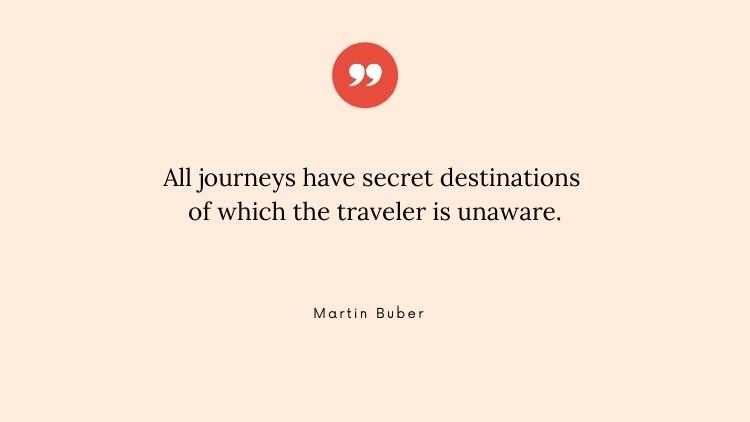
Jewish philosopher, Martin Buber (1878-1965) reminds us that our travels are about more than getting from Point A to Point B, seeing the sights, tasting the food, and learning about the history of a country; they are also about the internal journey.
While we may not be conscious of it at the time, there is always some new discovery about ourselves, others, or life that is being learned along the way.
These secret destinations might only be revealed in the reliving or retelling of the trip, but there is always much more to be gained from travel than mere movement and observation.
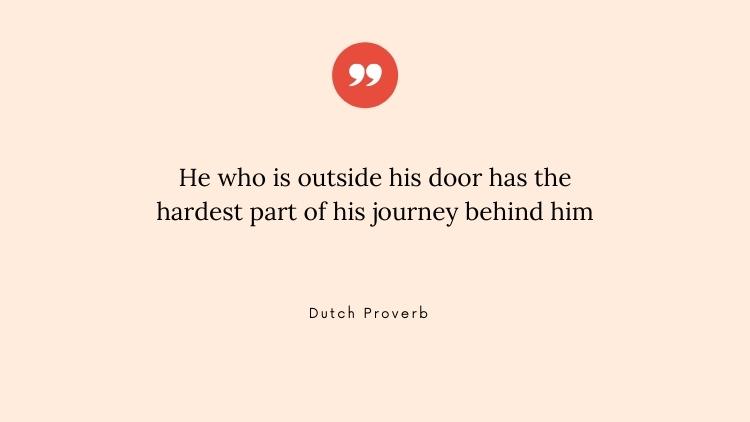
This solo travel quote is not attributed to any one person, but seems to be a Dutch proverb. It tells us that the hardest part of any journey is that which takes place before we set out from home. Dealing with all of the details can be tedious–researching and purchasing travel insurance, planning the itinerary, booking flights and accommodation, searching for the best deals, figuring out what to pack–and can seem never-ending.
- Solo Travel Planning Guide with Trends, a Checklist, and Insider Tips
- Going Alone? A Complete Guide to Travel Insurance for Solo Travelers
- Deals Page
- Packing list.
The hardest part truly is the preparation. Once you're out the door, a trip takes on a life of its own. So push through it, do your research, make your plans, sort it all out, then head off to your solo adventure!
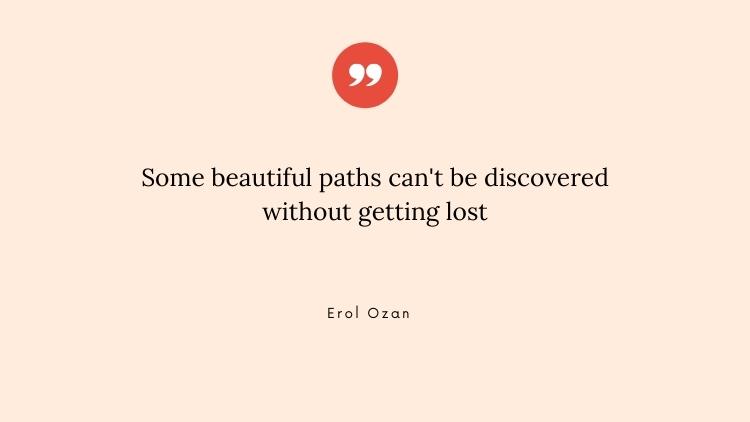
Erol Ozan, US-based writer and scientist, tells us that getting lost is sometimes the only road to beautiful discoveries.
It has certainly been the case for me from time to time. I once got lost in London, while in search of an elusive pizza joint. The meal at the end of the journey was all the sweeter for the confusion involved in getting there, and the kind stranger who set me on the right path. Lost in Paris, I stumbled upon a wonderful art installation that was not only fascinating on its own, but which added depth to my experience once I got back on track and found my original destination.
Of course, there are times when getting lost is problematic. But sometimes, it can result in unexpected delight.
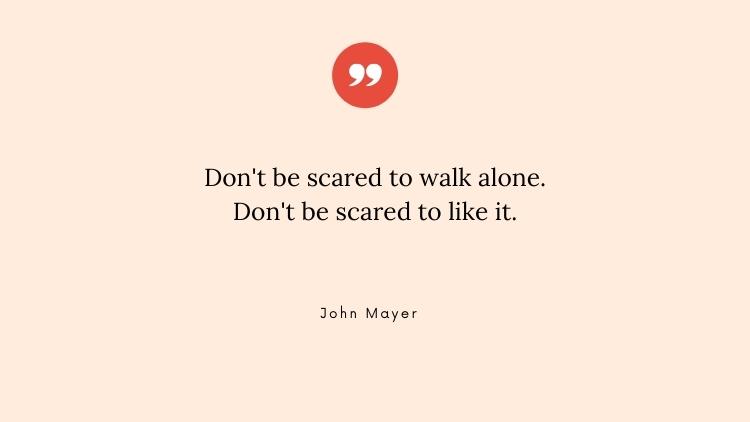
This solo travel quote is by American singer-songwriter John Mayer, from his song, Age of Worry. It is perfect in its simplicity, encouraging us both to not be afraid to go it alone and to not be afraid to enjoy it.
I often receive messages from readers who are afraid to set out on their first solo trip, who are worried that they will be lonely or unsafe. There are many posts on Solo Traveler that relate to conquering fear. Have a look at For Those Afraid of Traveling Alone, or Travel Solo for the First Time: Complete Guide for Newbies. If you are in this situation, check out these posts to see what other travelers have to say.
But there is also the issue of falling in love with solo travel. Mayer says, “Don't be scared to like it,” and I have actually heard from readers that they are worried that if they enjoy solo travel too much, that they will never be able to travel with family or friends again. I say, do it anyway! Don't be scared to travel solo. In fact, many people find that solo travel makes them better people and partners, in travel and in life.
Don't be scared to walk alone: take advantage of what Solo Traveler and the Solo Travel Society have to offer in terms of resources and encouragement.
Quotes on Solo Travel and Loving the Moment
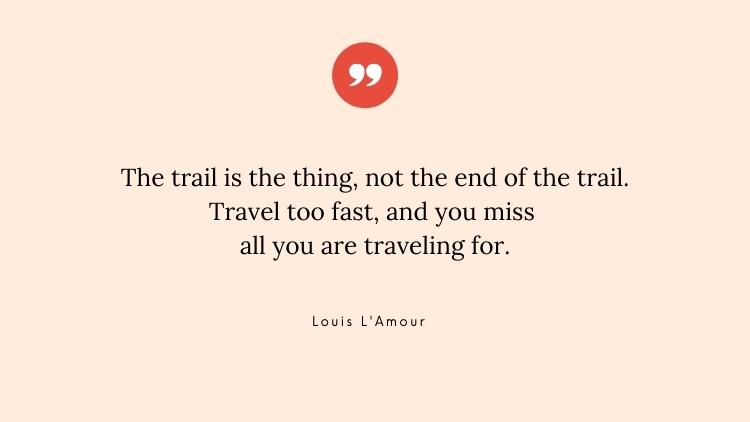
This travel quote comes from prolific American author Louis L'Amour (1908-1988). He was known largely for his Western novels, but also wrote poetry, science fiction, short stories, and historical fiction. L'Amour wrote 100 novels and more than 250 short stories, none of which I have read. However, I think this quote can easily stand alone.
It seems to me that this quote exemplifies the concept of slow travel. When we get caught up in seeing all of the sights, each of the monuments, one famous building or view or work of art after another, we can miss the true joy of travel, replacing it with an album full of photos of exactly what we had set out to see.
L'Amour encourages us to slow down, look around, live the whole experience of traveling, not just the stops along the way.
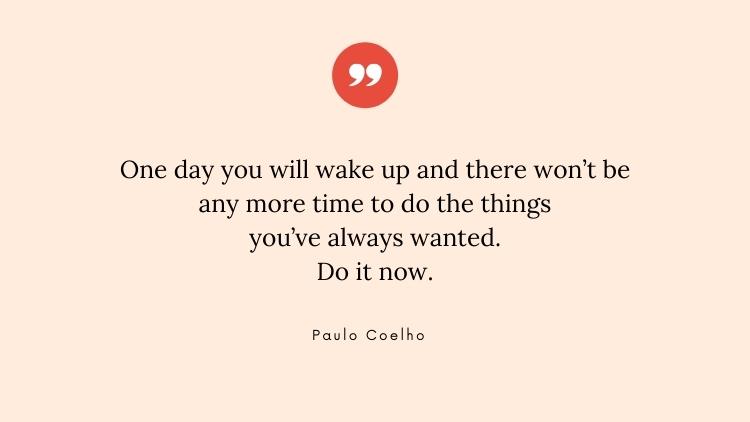
Brazilian writer, Paulo Coelho has written more than 30 books, the most well-known being The Alchemist, which has become one of the best-selling books in history.
This particular quote speaks for itself. It really doesn't require any analysis from me. We all know it to be true: our time here is finite, and our time available to travel solo even more so.
We've all known people who have worked their entire lives, putting travel on hold for some future date that never arrived. Seize the opportunity to travel whenever and wherever it presents itself. Don't put it off for another time when it will be more convenient, or when you will have more money, or when you will have someone to travel with, or when some other criteria has been fulfilled. Do it now!
Do it now.
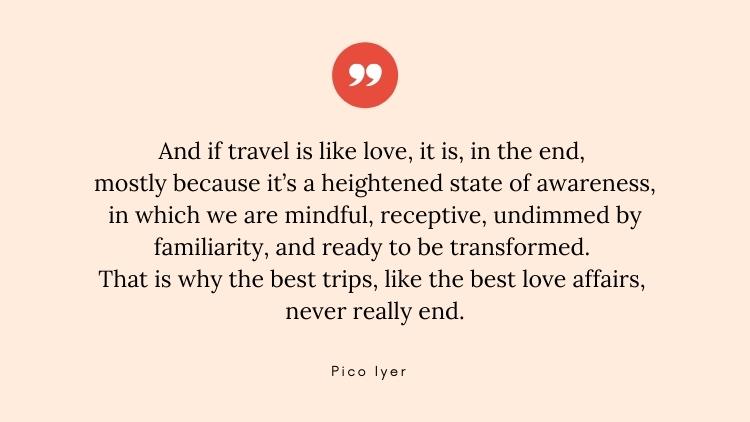
Pico Iyer, essayist and novelist was born in England to parents from India, and educated at Oxford and Harvard. Iyer is well known for his travel writing, and has delivered TED talks on the art of stillness and the question of where is home.
This solo travel quote is from an essay entitled Why We Travel. I really enjoy the way that he explains how travel is like love.
For if every true love affair can feel like a journey to a foreign country, where you can’t quite speak the language, and you don’t know where you’re going, and you’re pulled ever deeper into the inviting darkness, every trip to a foreign country can be a love affair, where you’re left puzzling over who you are and whom you’ve fallen in love with.
I have often felt that there is something quite romantic about travel, though I had never articulated it. Iyer describes the parallels between love and great journeys in such a vivid way that it all makes sense to me now. That sense of discovery, of trepidation, of a loss of control, of both questioning and surrendering to the moment–it occurs in both travel and love. Both have the capacity to change us, and to live on long after we have returned home or parted ways.
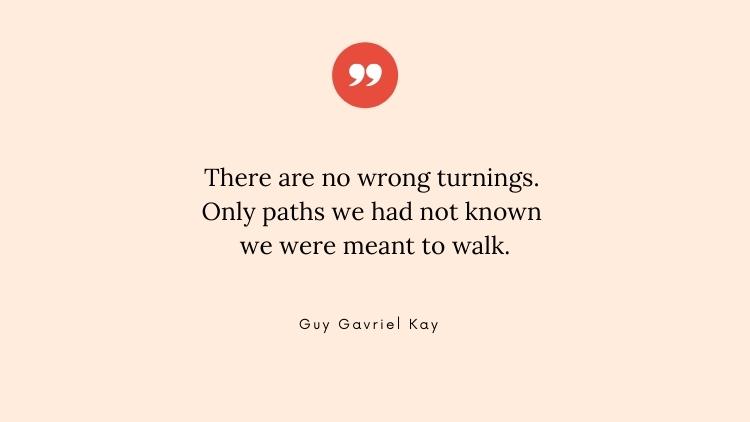
This solo travel quote is by Guy Gavriel Kay, Canadian fantasy fiction writer, from his book, Tigana.
I think it applies well to travel–especially given the number of times I have gotten off at the wrong stop, taken the wrong exit, or wandered the wrong direction down a street in search of something or other that I wanted to see.
Almost always, those “mistakes” have turned into new discoveries. In some cases, it has seemed as though they were meant to be, as when I got lost on my way to the Rodin museum in Paris. I stumbled across the Centre for Canadian Culture, which was featuring a video installation based on one of Rodin's sculptures that I would later see, once I found my way. The accidental discovery enhanced my experience at the museum, and I would have missed it altogether if I had taken a direct route from the metro.
I agree with Kay; in many cases, there are no wrong turnings. Frequently, in my experience, losing my way has resulted in even more interesting experiences.
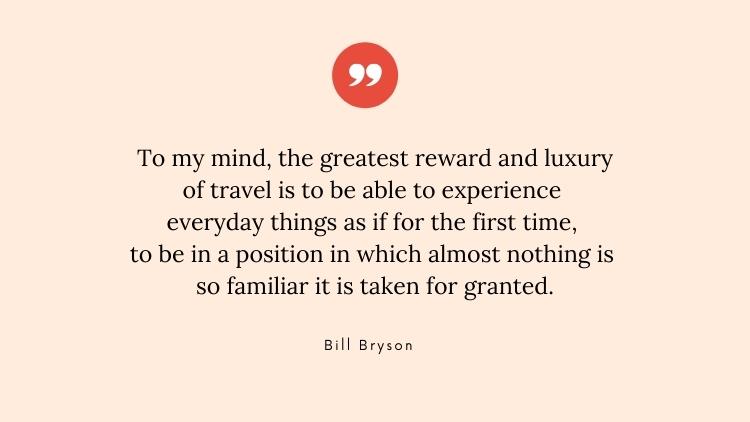
This quote articulates something I have always felt but never bothered to put into words: the great reward and luxury of travel lies in finding the ordinary extraordinary. Bill Bryson, author of (among other books) the humorous travel memoir A Walk in the Woods, has pinpointed it with this quote.
Everyday activities in which you participate at home–shopping for groceries, grabbing a coffee–can seem beautiful and special in another place.
Discovering the manner in which coffee is poured, served, and enjoyed in another country can seem magical to a traveler, even though it is no more remarkable to a local than your daily coffee ritual at home is to you.
Picking up groceries–watching how people select their produce, seeing what is offered on store shelves, listening to the conversation between shoppers and vendors at a farmer's market–becomes a fascinating learning experience which offers a glimpse into the local culture.
In the same vein, another luxury of travel is that you actually have the time to slow down and appreciate these differences, to experience stopping for coffee or choosing cheese as if for the first time. It may even extend to seeing your own habits in a different light once you return home.
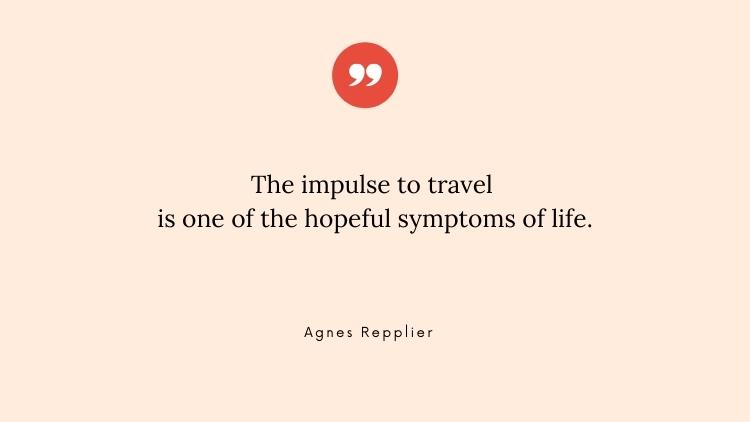
This quote comes from American essayist, Agnes Repplier (1855-1950). It is appealing for the positivity that it attributes to the desire to see the world. If we weren't hopeful about the future, about what we will encounter as we venture forth, about the people that we will meet, what would be the point?
I agree that the urge to travel is inherently hopeful. Before heading off on any trip, I have many dreams that I hope will be fulfilled: to meet interesting people, to learn about another culture, to discover culinary traditions, to see my home and the world from a different perspective.
Solo Travel and Self-Confidence
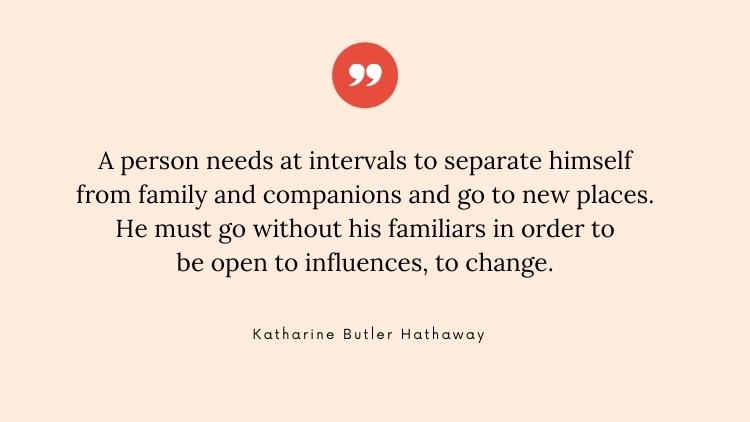
As a child, suffering from tuberculosis of the spine, Katharine Butler Hathaway (1890-1942) was confined to her bedroom, strapped to a board, for ten years in an effort to prevent her spine from curving. She developed a remarkable imagination during this time and went on to become a writer.
I loved this quote when I first stumbled upon it, but appreciated it even more once I heard the story of the author. I can't wait to read her book, The Little Locksmith, in which she relates the story of her life.
Hathaway speaks of making the choice to be governed by fear or by creativity; as an adult, she analyzed everything according to this principle and always chose creativity.
I think there is a parallel here related to solo travel. Pushing through the fear of the unknown, taking that first trip alone, facing unfamiliar places, people, cultures, languages–we encounter it on every trip. By choosing not to be dominated by fear, we keep ourselves open to change and continual growth.
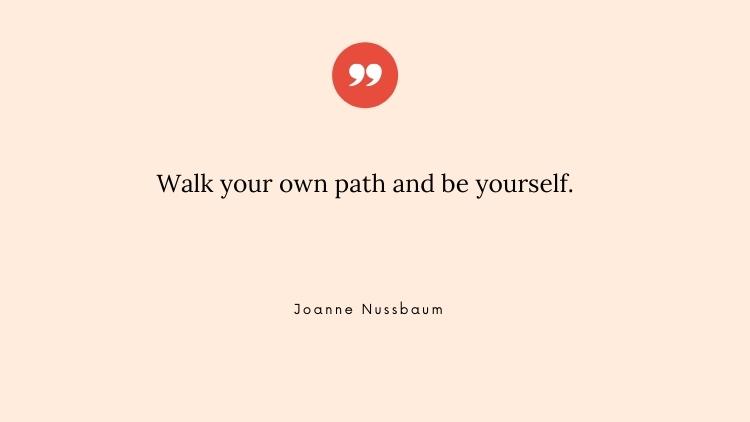
This quote comes from American writer, Joanne Nussbaum, author of Mongolia Monologues: One Woman's Quest to Experience, Learn and Grow…
The moment I stumbled across this quote, I thought of the members of the Solo Travel Society on Facebook. Whenever a topic about travel–particularly about traveling with others, meeting up with other travelers on the road, or the potential for loneliness when traveling solo–comes up, it invariably inspires comments from members about how much they value their independence and freedom.
This quote could be a tagline for solo travel. It strikes me that walking your own path is exactly what we encourage people to do and precisely why so many people love to travel alone.
In our daily lives, we perform many roles and are many things to the many people in our lives. Joanne Nussbaum lived her whole life in Ohio, working and raising a family. Suddenly, at the age of 53, she joined the Peace Corps and set off for Mongolia.
When we travel solo, we have the unique opportunity to just be ourselves. We alone decide when to get up, where to go, what to eat, who to talk to (or not), how to get from one place to the next.
I encourage you to take Joanne's advice. Walk your own path. Be yourself. I also encourage you to take the advice of the Solo Travel Society: travel alone.
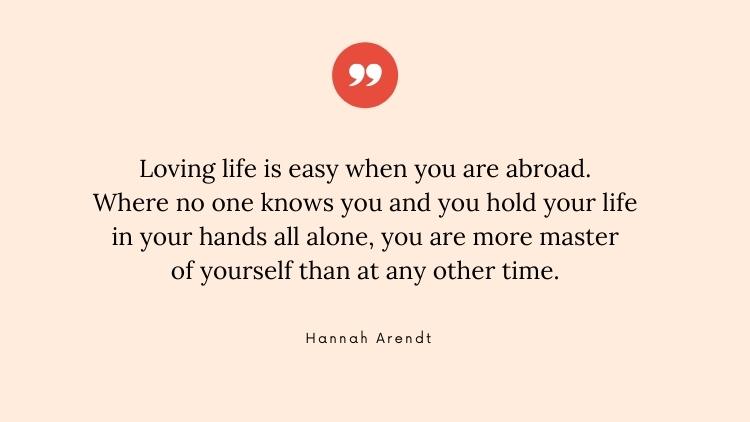
Born in Germany, Hannah Arendt (1906-1975) described herself as a political theorist and wrote about power, politics, democracy, authority, and totalitarianism. This solo travel quote seems to me to be of a considerably less serious and academic nature, but very appropriate for us as solo travelers.
I sometimes hear people speak about how solo travel requires us to take care of everything ourselves–transportation arrangements, accommodation reservations, decision-making around where to go, what to eat, which tour to take–and that there is no one with whom to share a sunset or a meal, or to watch our luggage while we grab a coffee. All of that is true. However, I don't see these as negative aspects. Yes, all responsibilities sit with us, but I prefer to think of it the way that Hannah Arendt expresses it: that we have all of the options, all of the power, all of the freedom in our hands when we travel solo.
Loving life is indeed easy when all of these elements are in our control.
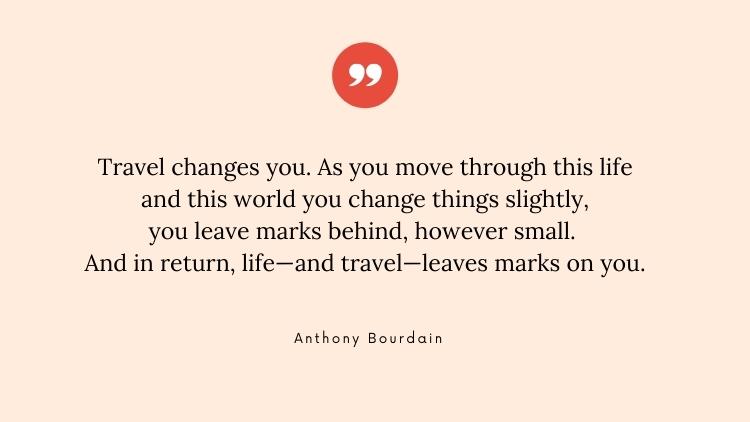
American chef, author, and television personality Anthony Bourdain, star of travel and food shows such as No Reservations, The Layover, and Parts Unknown, inspired many of us with his curious and enthusiastic approach to travel and learning about cultures around the world.
I'm not sure what more there is to add to this quote: it's pretty self-explanatory and complete on its own. Though the things that leave marks may be different for each of us, there can't be any doubt that we both collect them and leave them behind as we travel.
In the act of giving and taking, learning and sharing, we all benefit.
Bourdain went on to say, “Most of the time, those marks–on your body or on your heart–are beautiful. Often, though, they hurt.” Even still, if I had to choose between accumulating and leaving marks, or staying put and trying to remain unscathed, I would choose solo travel every time.
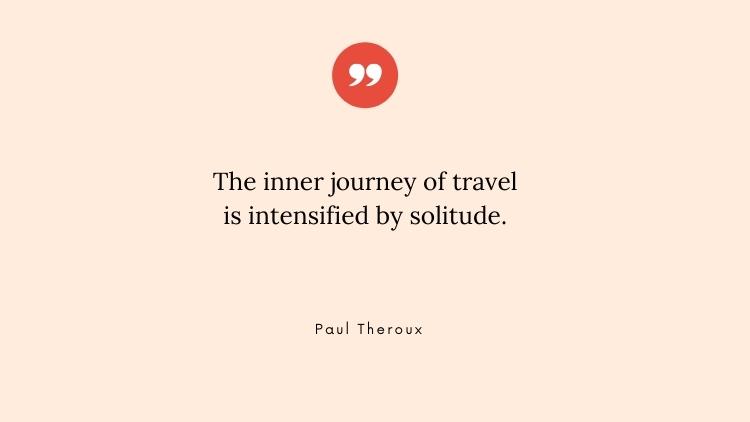
This solo travel quote is by Paul Theroux, American travel writer and novelist, from an interview conducted by Alec Ash, published on salon.com. Rather than just applying my own interpretation of his words, let me first share with you the rest of what he had to say on this topic:
If people go hiking with their wife in the Alps, that is not the same thing as going alone. When you come home at night, have a drink and talk about the day with your spouse, that is different from being alone, writing your notes, and having a drink in a solitude which makes you reflect very deeply on your motives, and why your wife or husband isn’t there. So the inner journey is the journey taken by the solitary traveller.
To a large extent, I agree; solo travel affords me so much more time to observe and absorb, reflect and analyze. The learning I gain from it relates to the outer journey and the destination, as well as the inner journey and my self. I learn more about who I am as I navigate unfamiliar situations, languages, cultures, and transportation systems.
But there are also things to be learned from my occasional trips with others – though these largely center on my relationships with them, and how we interact with one another and face the world together.
I do believe the inner journey is richer when taken solo.
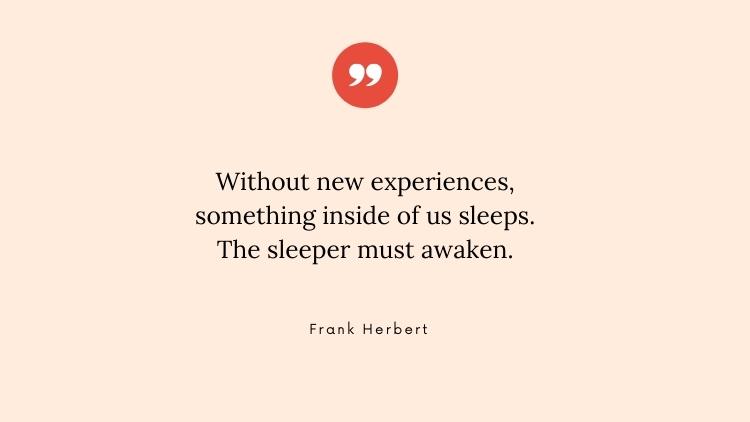
American science fiction writer, Frank Herbert (1920-1986), was known for his novel, Dune and the five following sequels. He tells us that without adding new experiences into our lives to shake things up, something inside of us remains asleep.
What better to inject new experiences and excitement into our lives than solo travel?
Traveling alone, I find that all of my senses are heightened. I see things in different ways. I notice the tiniest details that I would never give a second thought to on a regular day at home. I am the exact opposite of sleeping–I am hyper-awake, drinking up every drop of my days.
And it extends into my daily life–at least for a little while–once I return home. I see home through eyes slightly altered from when I left.
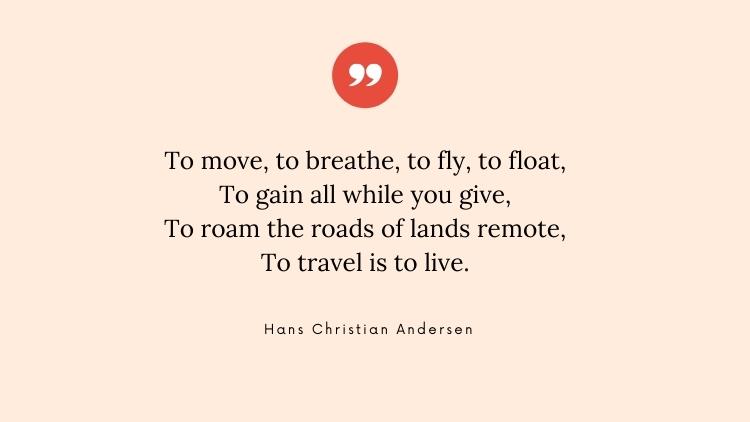
This quote by Danish author, Hans Christian Andersen (1805-1875) comes from his book, The Fairy Tale of My Life: An Autobiography.
Although best-known to most people for his fairy tales, the Danish author also wrote plays, travelogues, novels, and poetry. In fact, one of his first published works was a short story entitled, A Journey on Foot from Holmen's Canal to the East Point of Amager. His early work was well-received, and earned him a grant which allowed him to travel around Europe and continue his writing.
I like this solo travel quote for two reasons. First, the line “to gain all while you give” reminds me of the value of both learning and sharing knowledge as we travel. The idea that we pick up a little and leave a little behind is one of the aspects of solo travel that I treasure the most.
Second, the line, “to travel is to live” strikes me as one that will resonate with many of you. When I asked members of the Solo Travel Society, “Why do you travel?” one of the emerging themes from the responses was that it makes us feel more alive–that in traveling solo, we feel freer, our senses are heightened, and we are entirely open to new experiences. Certainly, this has been my experience as well.
The Importance of Travel
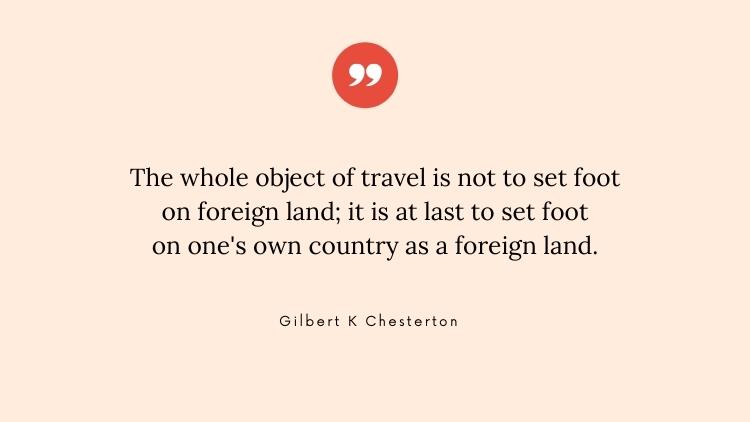
This quote by Gilbert Keith Chesterton, English writer, philosopher, journalist, art and literary critic (it's a very long resume!) is one that I suspect not everyone will agree with. It suggests that the real purpose of travel is not to discover other countries, but to return home and see your own country as a traveler would – with fresh eyes.
I'm not sure that I see my home as a foreign land when I return. Certainly, after spending time in other countries, I feel a renewed appreciation for the things that I already value at home, that may have been missing at my destination. Some comparisons are drawn, some weighing of alternatives takes place – Do I like this way of doing things more than that one? Should I incorporate this newly-discovered tradition into my life? – but I don't experience the sense of discovery that travel offers.
Maybe I haven't spent enough time in foreign lands. Yes, maybe that's the key – more travel, for longer periods of time!
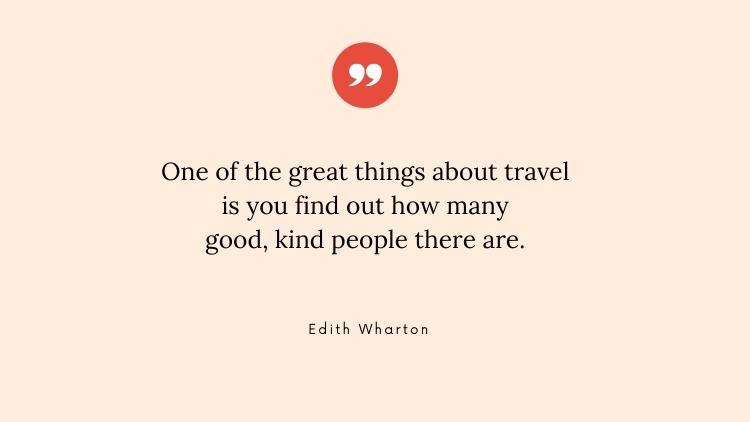
Edith Wharton (1862-1937), American novelist, designer, and short story writer loved travel and spent several months each year in Europe.
I like this quote because it honestly represents my experience of solo travel. I cannot count the number of times that a stranger has come to my aid, or engaged me in random conversation that taught me something new, or shared something special about their lives or their home, or extended an unexpected kindness to me while I have been traveling.
Kind people are everywhere, if you open yourself up to meeting them. When traveling solo, you are naturally more available to receive people in this way, facing outward, inviting the world in.
I’ll never forget the kindness of a stranger on my first solo trip, and members of the Solo Traveler community have many heartwarming tales to tell as well.
Discovering through travel just how many kind people are out there may just restore your faith in the world.
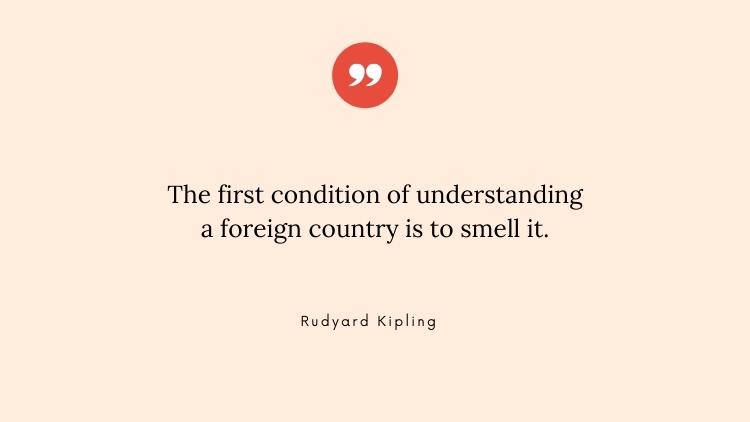
I can still remember the smells of places that I visited many years ago. Like the scent of my grandmother's house, they stay with me.
Some I can describe, like the vague hint of nutmeg in the air in Grenada; some I can't, but recognize immediately upon encountering again, like Prague; and one place, Bermuda, was remarkable for the fact that I could smell nothing but fresh air.
I can remember how specific places at a destination smelled as well: the oily, oppressive air in the New York subway in the heat of summer, just-picked grapes being pressed at a winery in British Columbia's Naramata Bench, the intermingling aromas of cured meats, fresh fruit, seafood, and hot peppers in Barcelona's Boqueria Market.
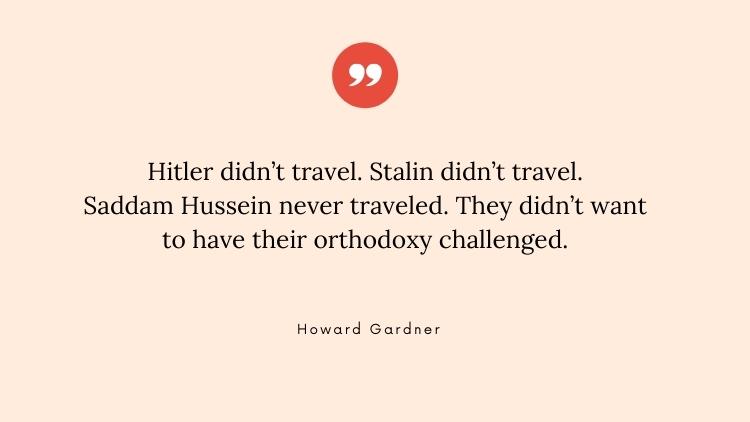
American developmental psychologist and Harvard University professor, Howard Gardner makes the point that those who do not want their views and beliefs challenged–in this case, very famous leaders–don't travel extensively.
As travel has the effect of broadening one's horizons, increasing exposure to other cultures and ideas, and demonstrating not just our differences, but also our commonalities, people who have a vested interest in maintaining their positions are not interested in the discovery that travel affords.
So if, for example, dictators don't travel broadly, so as to preserve their single-minded orthodoxy, what does that say about those of us who do travel?
I think it means that we are open to new ideas and new ways of doing things. We welcome having our assumptions challenged and delight in learning. Solo travelers, in particular, need to be very flexible, which contributes to our ability to assimilate new information.
So, if you don't want to learn and grow, but only to hold on to what you currently believe to be true, don't travel. If, on the other hand, you hunger for knowledge, crave having your biases challenged, and find joy in turning your ideas upside down, travel on!
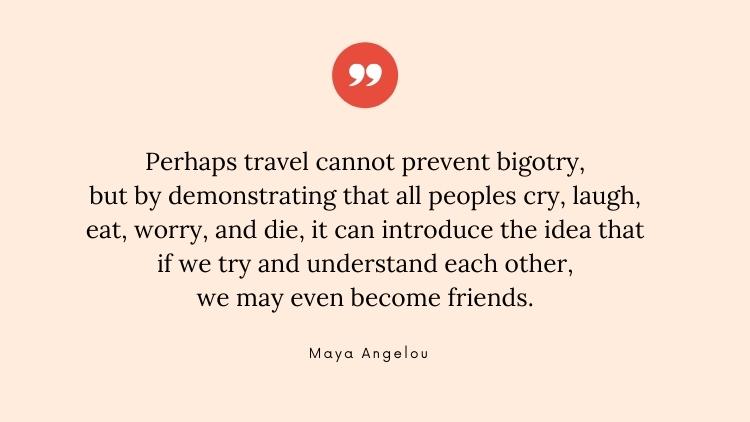
This quote from the late Maya Angelou will not likely be new to many people, but I always think it bears repeating.
It seems to me that not understanding others is the root of many problems between people. It is easy to forget, when caught up in passionately defending one's own position, that there are real people on the other side of the argument–people with whom we share all of the same basic components of life.
While travel won't necessarily resolve our differences, travel–and especially solo travel, which presents the opportunity for one-on-one encounters with local people–can foster relationships that allow us to move towards seeing and understanding others as individuals, not as representatives of a particular country or ideology.
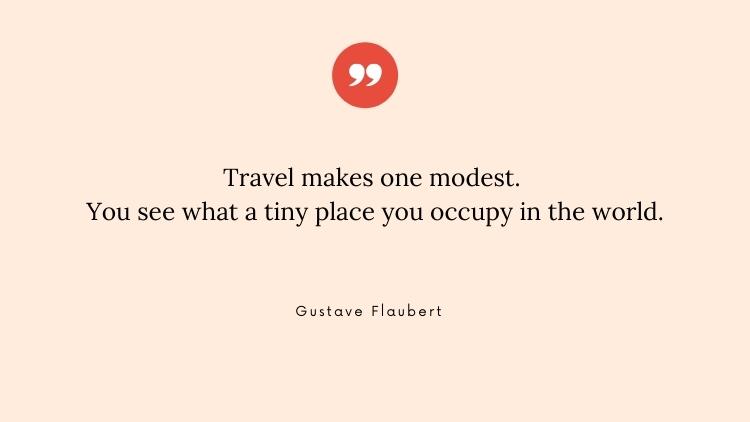
This quote from French writer, Gustave Flaubert, author of Madame Bovary, reminds us of one of the wonderful benefits of travel: the opportunity to expand our vision and perspective and see ourselves in the broader context of the world.
It is easy, perhaps inevitable, to become consumed by the issues and politics that affect our daily lives at home, for our world to shrink. There is even a certain inadvertent arrogance in the focus on our immediate environment to the exclusion of others.
Travel can cure you of this myopia.
In the same way that everything looks so small when flying above it in a plane, travel makes us see that we truly are very tiny fish in a magnificently huge pond.
More Quotes on Travel and Solo Travel
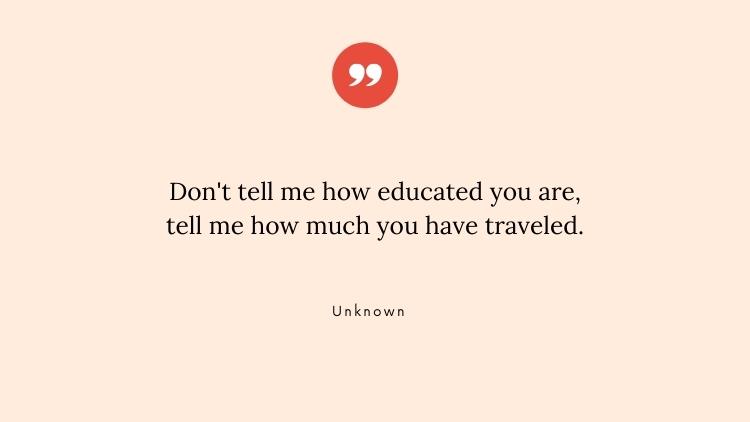
I have seen this quote attributed to the Prophet Mohammed and have also seen it vigorously disputed. For now, I will not claim to know the author, but if you have a reference, please let me know in the comments section below.
Regardless of the origin of the quote, it represents an interesting perspective. Initially, I agreed, thinking of some of the mind-expanding, life-altering experiences that travel can bring.
But it also requires something of the traveler, doesn't it? An open mind, a sense of curiosity, a willingness to have one's assumptions and cultural biases challenged and sometimes defeated – surely these must be present.
Isn't that also the best way to approach education? It is as possible to successfully finish school without broadening your horizons as it is to return from traveling without having disturbed your existing mindset.
In my view, it comes down to how you approach life.
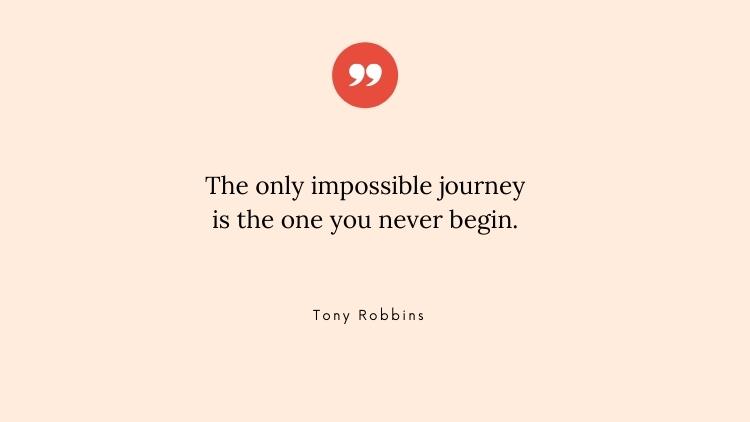
Tony Robbins, American life coach, self-help author, and motivational speaker–yes, that guy from the late-night infomercials!–is the source for this solo travel quote. I once saw him in person, and I have to say that he truly has a huge presence, and I can understand why people find him so compelling. He is very charismatic and his presentations can be quite motivating.
Whatever your feelings may be about the guy and his work, I think this quote is great. Obviously, the clearest path to not accomplishing something is to never attempt it. But I think this statement also points out that what most often prevents us from getting from the sofa to our biggest travel dreams is ourselves. Fears and insecurities, lack of information, perhaps not having people around us as solo travel role models.
Solo Traveler and the Solo Travel Society on Facebook can help. Worried about being lonely? Check out How to Travel Alone Without Being Lonely, which contains lots of tips and links to additional related posts. Not sure where to start in terms of planning out your trip? Start here. Nervous about how to manage the first day in a new place? Feeling Overwhelmed? How to Conquer First-Day Solo Travel Anxiety will reassure you that everyone gets scared, and there are tried and tested methods for pushing through the fear. For a comprehensive set of tips, read our Ultimate Guide to Travel Alone and Love It. Members of the Solo Travel Society regularly come to the rescue as well by sharing personal experiences, asking and answering solo travel-related questions, and offering encouragement and information to fellow travelers.
Don't let your travel dreams become impossible journeys: take advantage of all of the resources gathered on the blog and the expertise of the over 250,000 travelers in the Solo Travel Society.
Collectively, we've got your back!
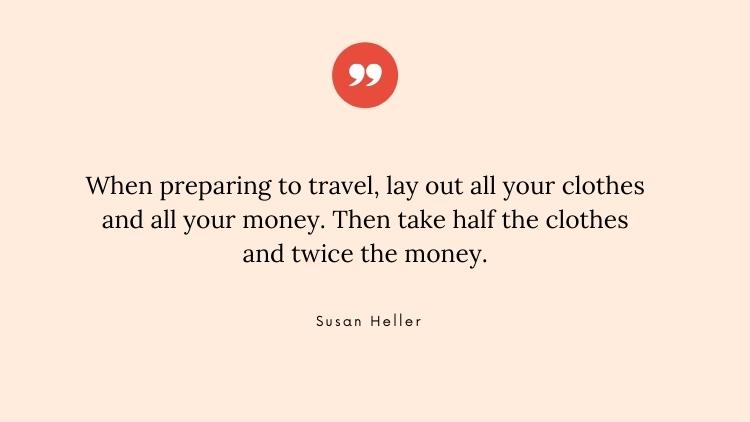
This quote is by Susan Heller. When it first appeared in the New York Times in 1987, I doubt that anyone could have imagined that this would become one of the world's most frequently quoted pieces of travel packing advice.
It's good advice, though–and I should take it more often! At least, I should heed the suggestion to take less clothing. While Janice is the queen of packing light–her post about how to pack, Bare Minimum Packing is one of our most popular and enduring–I always take too much.
But what of Heller's suggestion to take more money? I'm not sure that is always necessary, though I suppose it depends on how you travel. We have found inexpensive ways to enjoy many places. Read How to Make Solo Travel Affordable, Cheap and Even Free
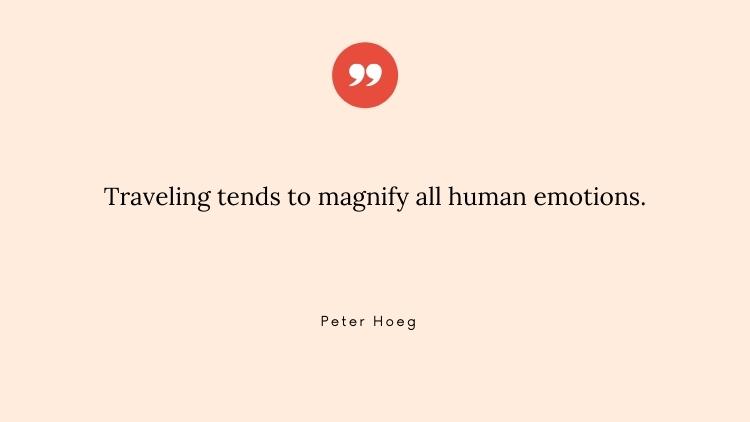
Danish writer, Peter Hoeg tells us in this solo travel quote that our emotions can be amplified when traveling. I can't imagine that anyone would disagree with his statement (though, if you do, please share your thoughts below) and I think it may apply even more to solo travelers. Without the distractions of interacting with travel companions, you can focus more intently on your individual internal experience.
The full gamut of travel emotions, including excitement, joy, surprise–and, let's face it, fear, sadness, and anger–can feel bigger and more intense when we're traveling alone. But even the latter feelings can have an upside.
Sometimes, fear can help keep you safe, or anger can help you find a solution to a problem. Sometimes, sadness is an entirely appropriate response to places and situations we encounter, as explored in this post about why we travel to sad places, and experiencing it intensely is actually an act of honor and remembrance.
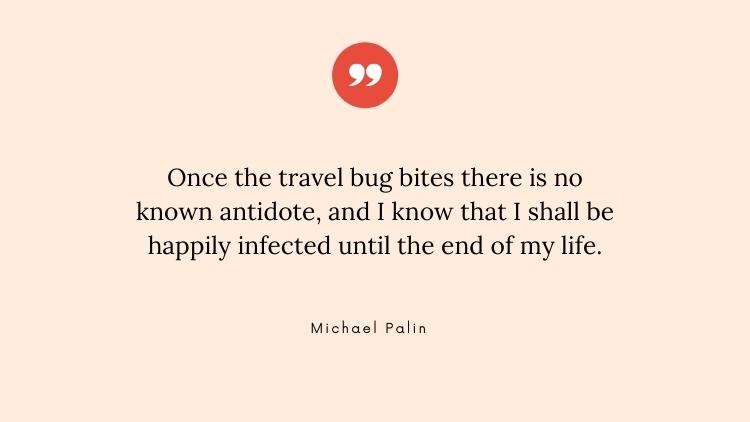
You may recognize this quote as being from English comedian, actor, writer, documentary maker, and traveler, Michael Palin. Famous for his work with the comedy group Monty Python, he went on to create documentaries about travel.
It is easy to understand his perspective in this quote: once you have traveled, you want to travel more. Like the inability to eat just one chocolate, the more travel experiences you accumulate, the more you want to discover. The travel bug can be quite persistent! Unlike chocolate, I'm not sure that there is a downside to craving more travel. And, like Palin, I am quite content to be infected with this particular virus.
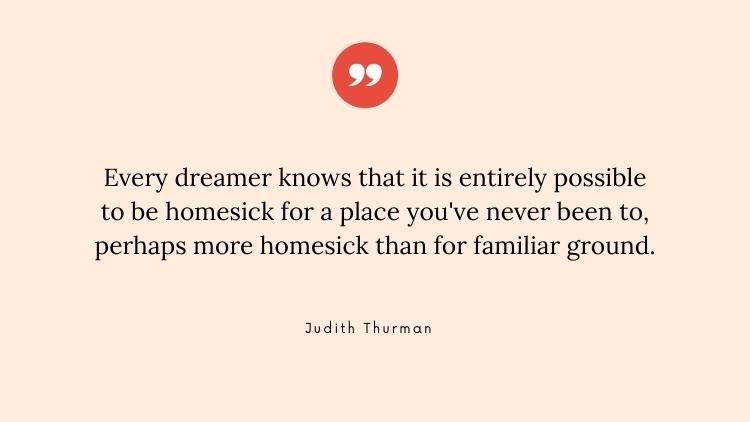
This quote about travel comes from American writer, Judith Thurman. I was struck by her words, not because I have experienced this phenomenon of feeling homesick for a place that I have never been, but because I have witnessed it in a friend and fellow traveler.
For the more than two decades that I have known him, D-G has longed to travel to and live in India. Having grown up in Newfoundland, then lived for many years in Quebec, he was accustomed to Canada's long, cold winters and lots of space. Yet, somehow, he could not shake the idea that India was where he belonged.
So, off he went to travel around the country on his own. When he returned, I swear that he pined for India as though it had been his childhood home. He was absolutely homesick for this place he had never lived, and desperately wanted to return.
He left his job, sold all of his belongings, and set off on a solo adventure to build a new life. And so he has. Years later, D-G has created a beautiful life for himself in Bangalore, and continues to travel extensively throughout the country, with no plans to return.
I have never felt this pull to be somewhere else. In fact, every time I return from a trip, I see my home country a little bit differently and appreciate it more. But it is clear to me now that the possibility of feeling homesick for a foreign land is very real.
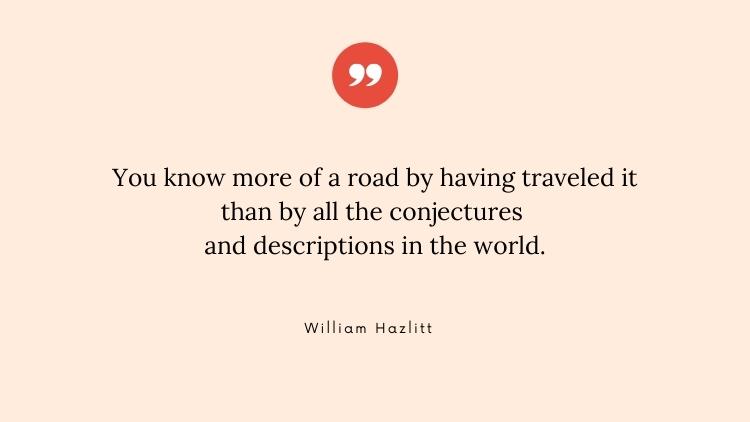
William Hazlitt (1778-1830), English writer, critic, philosopher, and painter makes a point that is quite obvious to most of us now, in an age when travel is much more possible for far more people than it would have been in his day: that there is far more to be learned from making a trip yourself than from hearing about it from others or making assumptions about what your experience might be.
You need to travel the road.
Good travel literature, film and television, blogs, and storytelling can all be wonderful mediums for learning about a destination. But none of them can replace actually going, walking the streets, smelling the air, touching the soil, meeting the people, tasting the food, experiencing the trials and tribulations of navigating a different culture, language, and transportation system.
If you don't travel the road yourself, you will only understand what it is like for someone else.
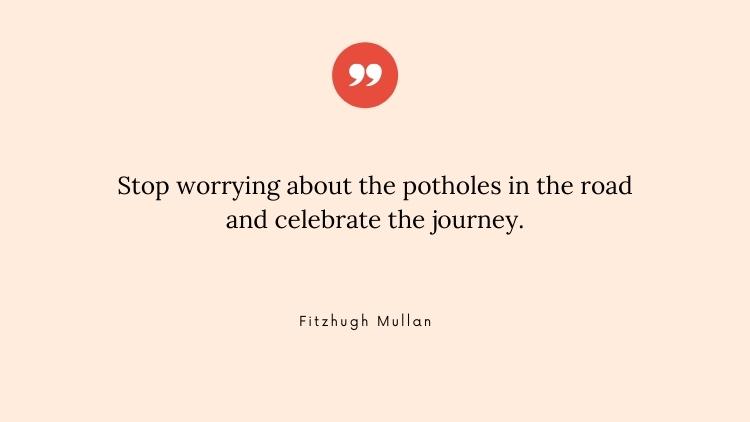
This quote comes from Fitzhugh Mullan, American pediatrician, writer, editor, and health policy expert. Someone, I assume, who deals with the potholes in life every day.
It is easy to get caught up in the things that go wrong when we're traveling–the missed flight, the lost bag, the misplaced reservation, the misunderstandings due to language or cultural differences. And sometimes, especially on a long journey, these things can pile up and get the better of us at some point.
Mullan encourages us to see past it, to look at the bigger picture. Treat the problems like potholes, not canyons. Step back, take a deep breath, try to see the humor in the situation, then carry on.
Celebrate the journey. Live in the present. Soak up every moment.
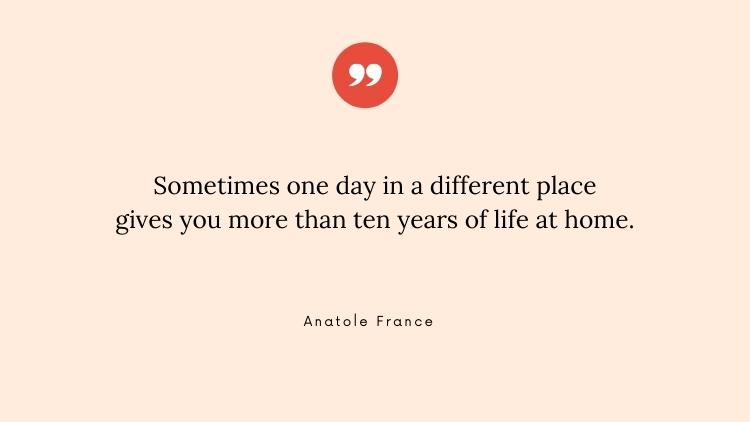
This travel quote comes from Anatole France (1844-1924), a Nobel Prize-winning French poet, journalist, and novelist. I like it because I understand what it is like to spend a long period of time essentially treading water, staying in one place, caught up in the mundane details of everyday life.
I remember my first trip abroad and the moment when I understood how simultaneously easy and life-altering travel can be.
The act of stepping out of routine, being surrounded by a different landscape, encountering unfamiliar sights, smells, tastes, and sounds, new people, another culture–so much can be experienced in just one day.
No list like this can ever be considered complete. What are the best solo travel quotes that you have come across? Please share them and your thoughts below.
